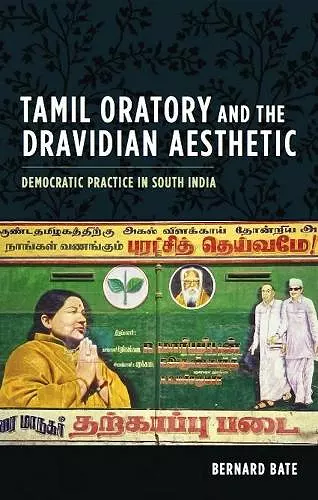Tamil Oratory and the Dravidian Aesthetic
Democratic Practice in South India
Format:Hardback
Publisher:Columbia University Press
Published:13th Nov '09
Should be back in stock very soon

Bernard Bate is one of only a small number of scholars with the linguistic and language skills needed to carry out the ethnography of Tamil political speech. To the best of my knowledge, he is also the only one to have written such an ethnography. A remarkable accomplishment. -- Mattison Mines, University of California, Santa Barbara This extraordinary book exemplifies what ethnography aspires to be. It is richly located in locality and history, it gives voice to a tradition of oratory that has barely been studied by anthropologists, it enriches the study of the difficult terrain between linguistic and literary studies, and it combines deep textual knowledge with a keen eye for living social detail. Apart from its numerous insights into ritual, education, love, speech, and devotion in Tamil cultural life, it is a pathbreaking argument about how the most proleterian and populist of political subcultures can draw on the aesthetic and literary riches of a classical tradition that spans several millenia. Bate's book is a tour de force in revealing the social life of language. -- Arjun Appadurai, New York University Bernard Bate's historically specific, ethnographically grounded, and politically salient study of Tamil oratory and Dravidian aesthetic is a groundbreaking examination of this phenomenal outlier in a universe of languages where all is relative. It inquires into the recalcitrant sensuousness (not sensuality) of a language that is capable of goading the ultimate sacrifice of its native speakers, a language in which sound and sense flow as rival and reciprocating energies. Tamil Oratory and the Dravidian Aesthetic is mandatory reading for any student in the humanities interested not only in the enchanting power of a language's beauty but also in the impassioned forces of the sublime that make it 'dangerous.' -- E. Valentine Daniel, Columbia University, and author of Charred Lullabies: Chapters in an Anthropography of Violence
This is a book about the newness of old things. It concerns an oratorical revolution, a transformation of oratorical style linked to larger transformations in society at large. It explores the aesthetics of Tamil oratory and its vital relationship to one of the key institutions of modern society: democracy. Therefore this book also bears on the centrality of language to the modern human condition. Though Tamil oratory is a relatively new practice in south India, the Dravidian (or Tamil nationalist) style employs archaic forms of Tamil that suggest an ancient mode of speech. Beginning with the advent of mass democratic politics in the 1940s, a new generation of politician adopted this style, known as "fine," or "beautiful Tamil" (centamil), for its distinct literary virtuosity, poesy, and alluring evocation of a pure Tamil past. Bernard Bate explores the centamil phenomenon, arguing that the genre's spectacular literacy and use of ceremonial procession, urban political ritual, and posters, praise poetry are critical components in the production of a singularly Tamil mode of political modernity: a Dravidian neoclassicism. From his perspective, the centamil revolution and Dravidian neoclassicism suggest that modernity is not the mere successor of tradition but the production of tradition, and that this production is a primary modality of modernity, a new newness-albeit a newness of old things.
The overall achievement is both ambitious and highly worthwhile. Journal of Anthropological Research
ISBN: 9780231147569
Dimensions: unknown
Weight: unknown
288 pages